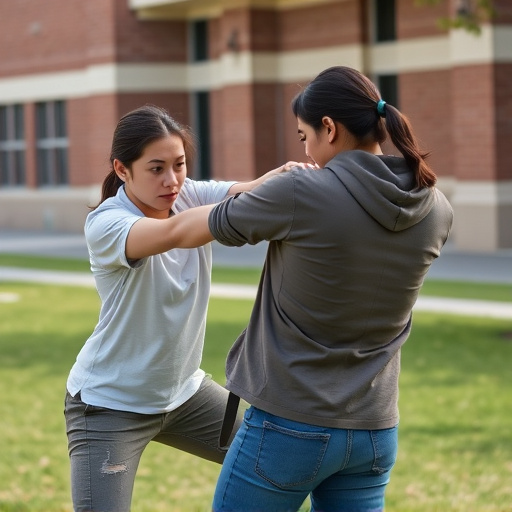For college students, understanding and prioritizing self-defense is vital, especially in unfamiliar settings like dormitories or late-night campus walks. With newfound independence comes personal safety responsibilities, and learning basic self-defense skills becomes a necessity in the digital era where security breaches can occur unexpectedly. Self-defense for college students involves awareness, confidence, resilience, informed decision-making, avoiding dangerous situations, and effective threat response. Empowering strategies enhance their ability to protect themselves, foster security, and contribute to a safer campus community. Understanding self-defense laws is crucial for navigating potential dangers while staying within legal boundaries. College students can access diverse resources like workshops, martial arts, and on-campus safety clinics for tailored training, with institutions prioritizing campus security to empower students in new environments.
College life brings new freedoms, but also presents unique risks. Understanding the importance of self-defense for college students is crucial for navigating the challenges of campus life. This article explores common threats on college campuses and delves into legal aspects and rights related to self-defense. We provide practical strategies and techniques for self-protection, along with valuable resources and training options specifically tailored for college students seeking empowerment and peace of mind.
Understanding the Importance of Self-Defense for College Students
For college students, understanding and prioritizing self-defense is paramount, especially in navigating unfamiliar environments like dormitories or late-night campus walks. The independence and freedom that comes with college life also brings new responsibilities, one of which is personal safety. In today’s digital era, where incidents of personal security breaches can occur unexpectedly, equipping oneself with basic self-defense skills becomes not just a choice but a necessity.
Self-defense for college students goes beyond physical techniques; it’s about fostering awareness, confidence, and resilience. It enables young adults to make informed decisions, avoid potentially dangerous situations, and respond effectively if confronted with threats. By learning simple yet powerful self-defense strategies, students can enhance their ability to protect themselves, build a sense of security, and contribute to a safer campus community.
Common Risks and Threats on College Campuses
College campuses, while vibrant and bustling hubs of learning and growth, can also present unique risks and threats to students’ safety. One significant concern is the rise in reported incidents of assault, harassment, and personal theft on college grounds. These incidents can occur at any time, from late-night library sessions to social gatherings, targeting both men and women. Additionally, navigating unfamiliar areas or attending events alone can expose students to potential dangers, especially in isolated locations.
Another common risk for college students is the use of technology, as digital devices have become essential tools for academics and daily life. While on campus, students may be vulnerable to theft or even cybercrime if they are not cautious. It’s crucial that young adults be vigilant and implement effective self-defense strategies tailored to their specific environment, empowering them to stay safe during their formative years.
Legal Aspects and Rights of Self-Defense
When it comes to self-defense for college students, understanding legal aspects and rights is paramount. In many jurisdictions, the right to protect oneself is a fundamental human right, recognized and protected by law. This includes the use of reasonable force in response to an imminent threat. College students should familiarize themselves with local laws regarding self-defense, as provisions can vary significantly from state to state or even city to city.
Knowing one’s rights enables students to act confidently and within legal boundaries when facing potentially dangerous situations. For instance, it’s important to recognize what constitutes a reasonable response in a given context. Self-defense laws often provide justification for actions taken to protect oneself or others from harm, but excessive force can be considered criminal. Therefore, college students must stay informed about their rights, allowing them to exercise self-defense effectively and legally while navigating the challenges of higher education.
Practical Strategies and Techniques for Self-Protection
For college students, learning practical strategies and techniques for self-protection is an essential aspect of personal safety on campus. Self-defense for college students involves a combination of awareness, avoidance, and effective physical responses. Start by staying vigilant in unfamiliar areas, avoiding isolated pathways, and trusting your instincts if a situation feels amiss. Carry essential items like pepper spray or a personal alarm as a deterrent.
In terms of techniques, basic self-defense training can equip students with powerful yet simple moves. Focus on key areas such as eyes, throat, and groin—a few well-placed strikes or holds can disable an attacker long enough for you to escape. Practice these moves regularly, ideally through specialized self-defense classes tailored to college students’ unique needs and situations.
Resources and Training Options for College Students
Many colleges offer resources and training options for self-defense tailored specifically to their students. These programs are designed to empower individuals with the knowledge and skills needed to protect themselves in various situations, especially as they navigate new environments and potentially unfamiliar areas. From basic self-defense workshops to more advanced martial arts classes, these initiatives cater to different fitness levels and interests.
On-campus safety clinics often provide a range of services, including personalized training sessions, self-defense demonstrations, and discussions on risk mitigation strategies. Additionally, many colleges partner with local law enforcement agencies or hire specialized instructors to conduct regular seminars and workshops, ensuring students have access to quality self-defense education. With the growing emphasis on campus security, these resources are becoming increasingly vital for college students seeking to enhance their personal safety while pursuing higher education.
